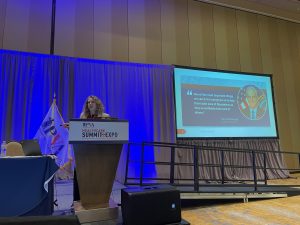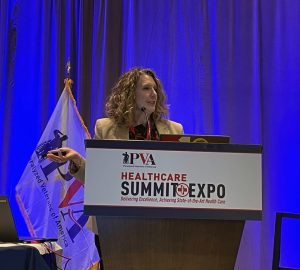Coping during COVID-19
Caregivers of veterans with spinal-cord injury and disease handle a plethora of challenges on an everyday basis, but the novel coronavirus (COVID-19) pandemic has required them to find new ways to cope with them and become resilient.
Continuing a theme from the first day of the Paralyzed Veterans of America (PVA) Healthcare Summit + Expo at the Omni Dallas Hotel in Dallas, Alicia Sloan, MPH, MSW, LICSW, a social worker at the Department of Veterans Affairs (VA) Puget Sound Healthcare System in Washington, presented Tuesday’s Day 2 breakout session about increasing caregiver resiliency using telehealth.
Sloan described some concepts of resilience, risk factors of caregiver stress and how the pandemic has challenged caregiver support. She also discussed how she and her team launched a support group for caregivers of veterans with multiple sclerosis (MS) through VA Video Connect (VVC), an app that allows veterans to video conference with their providers.
“Resiliency is the ability to withstand, recover and sometimes grow when faced with adversity,” Sloan says. “It’s an active process of enduring and successfully coping. It’s bouncing back after a crisis. And it’s also bouncing forward so you can adjust to that new normal. So, if you think about the pandemic, we’ve had to adjust to this new normal. So, if you can imagine the caregivers, what they must be going through.”

Sloan says a 2020 review study by Maguire and Maguire found there are many social and contextual factors that can affect the caregiver experience, including the care recipient’s type of multiple sclerosis (MS), level of disability, experience of symptoms, psychological distress; the caregiver’s relationship to the person with MS, gender, physical health, income/education and psychological appraisals; and time spent caregiving, social support, provision of information and health care services support.
Anytime she receives caregiver referrals, Sloan looks at this list and seeks out any resources that can help the caregiver. Sloan says it’s important for providers to include caregivers as part of the health care team and consider their perspectives.
“And I’m really concerned about self-care,” she says. “As we know, as professionals, sometimes self-care is really hard to do. In my support group, we always talk about self-care. Some of them don’t even know what that means. So part of the support group … is really expressing how they can do self-care in like a minute, or five minutes, or take a day respite or a vacation.”
Sloan reviewed several of the VA’s caregiver resources and support services, including social workers who work one-on-one with caregivers or in groups. Some veterans with MS also may be eligible for benefits such as VA beneficiary travel, aid and attendance, home-based primary care, Homemaker/Home Health Aide, Veteran-Directed Care or Adult Day Health Care and caregivers might qualify for the Civilian Health and Medicare Program of the VA, so they can have health insurance. She’ll refer caregivers to PVA, the National MS Society guides or the Elizabeth Dole Foundation and looks at local, county, state and federal resources to support caregivers. Sloan says she directs caregivers to these resources and helps them apply.
“Any of these kind of resources is going to help the caregiver increase resiliency and lower their stress level,” she says. “It’ll help them towards finding that time so they can feel less stress. They can take time for themselves.”
When talking to caregivers who are stressed, Sloan says she listens their stories and validates their stressors.
“I’ll identify the inner resources, and I think every person has some inner resources,” Sloan says. “We all have something inside of us that gets us through the day, that gets us through the tough times. So, I try to figure out what it is that caregiver has inside and how we can strengthen that and develop it more.”
She says the key to developing resiliency is caregiver self-care, which can be accomplished through support groups, assistance from family and friends and respite, among other things.
“They already have it hard as it is, and then we have a pandemic,” Sloan says. “Things changed. Support groups that met in person were now on the VVC, the VA telehealth, or on the phone. Some of the services, the caregiving agencies … in Puget Sound, there’s certain counties it’s hard to get a caregiver from an agency. Their caregivers have quit. And then during the early part of the pandemic, they were getting COVID, so they weren’t showing up.”
In addition, Sloan says VA-contracted nursing homes and adult day centers shut down, making it impossible for caregivers to find relief. So, the idea for a VVC caregiver support group was developed.
The group is called Rants & Raves, a title Sloan credited to her coworker Susie Ryan-Coy. Besides participating in regular venting sessions, the group also works on mindfulness and meditation activities and hears from educational speakers.
“One of the things I do is make sure they all know when they join the group this is a safe place to talk about these things,” Sloan says. “It doesn’t mean you’re a bad person if you have these feelings of rage inside of you. So, we’re really dealing with those feelings in the support group and processing.”
Sloan shared one relaxation technique she teaches caregivers to use in stressful situations called “square breathing,” which was developed by Army Ranger Lt. Col. David Grossman. The person breathes in for four counts, holds that breath for four counts and exhales for four counts.
“Deep breathing, mindfulness techniques are a way to bounce forward,” Sloan says. “Post-traumatic growth refers to positive changes experienced as a result of adversity or a life-altering crisis. So, there’s resilience, process of adapting, and then there’s post-traumatic growth, which is those positive changes you’re experiencing going through the change, the adversity.”
Lastly, Sloan says how positive psychology, the scientific study of human flourishing, relates to MS caregiver resilience.
One positive psychology element, she says, is permalicious, or PERMA for short, an acronym coined by psychologist Martin Seligman from the University of Pennsylvania.
“When you are permalicious, you are P for positive emotions, E for engagement, R for positive relationships, M for meaning and A for accomplishments. And those are the elements that makes us feel good about ourselves,” Sloan says. “So, that’s what’s going to help us become more resilient. And we want to harness that resilience, bridging those concepts in the individual with MS and to the caregiver and to the care partner, and to us.”
Overall, Sloan says the road to greater resilience is three stages: understanding, managing adversity and growth.
“As clinicians, we can utilize resources and tools in the VA like VA Video Connect and the VA partner and caregiver organizations while adapting concepts from resiliency theory, post-traumatic growth and identify and reinforce resiliency in our caregivers and veterans with MS to reduce their burden and stress,” Sloan says.



